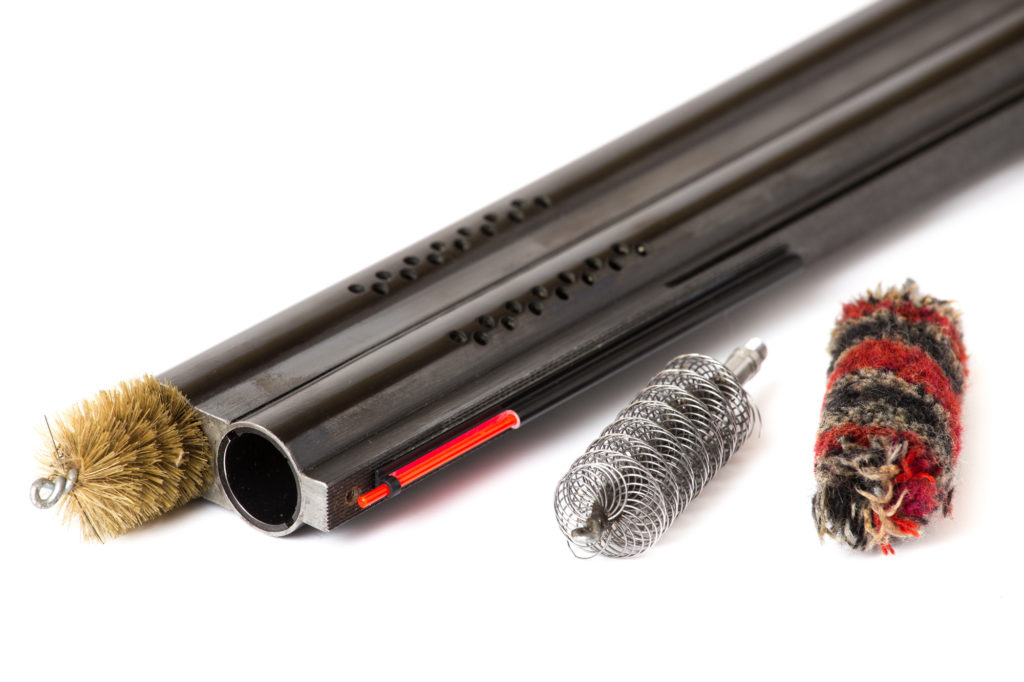
Some things in life are certain – like death, taxes, and rusty metal. Virtually all guns have metal. This means all gun owners fight a constant battle against rust.
Is your gun getting rusty? Did you inherit or buy an antique gun that needs restoring? Don’t worry. Most rusty guns can be returned to a like-new condition. Find out how to clean rust off a gun in this handy step-by-step guide.
Dangers of a Rusty Gun
Guns are dangerous, but a rusty gun is extra dangerous. Your gun is a machine with several moving parts that have to work perfectly for the gun to fire successfully. Rust can get in the way of these functions, causing the gun to malfunction.
Incomplete Discharge
A badly rusted barrel could cause a round to get stuck in the gun. When the round is not removed and the gun fired again, the weapon could explode. Incomplete discharges called squib loads are uncommon and usually are caused by faulty gun powder.
Failure to Eject
Rust can cause a “failure to eject.” Ammunition has two parts. There is the cartridge that contains gun powder and the projectile or bullet. After the cartridge explodes, it must then be ejected from the weapon.
Rusted parts could cause this process to fail. If the cartridge is not removed manually before the gun is fired again, it may explode.
Failure to Fire
Rust can cause a “Failure to Fire.” Failure to fire, or FTF, could mean your life. Imagine your life is in danger, and in that second between life and death, your gun doesn’t go off. You hear a click and nothing. What a nightmare!
Safety First
Accidental shooting deaths are more common than you might imagine. Between 2006 and 2016 there were 6,885 unintentional gunshot deaths in The United States.
Gun safety is your priority. Guns kill. When handling a firearm always keep safety at the forefront of your mind. Never handle a loaded gun unless you intend to fire it. Never point the business end of a gun, even an unloaded gun, towards yourself or others.
The first step to cleaning your gun is always safety. Before you begin, make 100% sure you have an unloaded weapon. Remove the ammunition from revolvers and keep them safely away from your work area.
Remove ammunition clips and always check the chamber. A round in the chamber is often forgotten, giving the gun owner a false sense of security.
Many accidental shootings happen this way. The hidden round in the chamber is unintentionally fired when play acting a shooting motion tragically killing or seriously injuring someone.
Kids and Guns
Keep guns out of the hands of children. Glamorized on TV and movies, guns speak to the curiosity of children everywhere. In 2014 alone, 2,549 children in the USA under the age of 19 died from or sustained an injury from an accidental discharge of a firearm.
Gun cleaning time is an excellent time to teach your children about gun safety. Show them from example how to be safe handling a gun and warn them that guns are not toys.
Don’t just forbid children from handling your gun. Keep your weapons safely locked-up. For additional safety lock-up ammunition separate from your gun.
How to Clean Rust off a Gun
You can be sure that rust won’t go away on its own. The rust on a gun will only get worse, taking away the beauty of the piece and eventually compromising the guns ability to fire properly. It is best to remove the rust immediately. Here is how:
What You Will Need
You can find everything you need lying around the house or at your local hardware store. Gather the following items:
- several dry cloths (wool is best)
- fine strand steel wool
- gun cleaning solvent
- gun cleaning tools
- WD-40
- gun oil or metal preservative
Step 1 Work Area
Start with a clean, dry, empty work table, or counter. Lay down a large dry cloth on your work table. The cloth will keep the parts from rolling around and falling on the floor.
Work in a well-ventilated area. The chemical fumes and smell from solvents can be hazardous to your health or at least give you a bad headache. Open a window and run a fan to circulate the air away from you.
Step 2 Disassemble
To properly clean a gun and be sure to remove all rust from the weapon you need to disassemble the weapon. Refer to your firearms operating manual for detailed instructions on how to disassemble and reassemble your gun.
Place each part of the weapon on the cloth in front of you. As you are removing the parts inspect them carefully for any grime or rust.
Step 3 Clean Everything
Clean each part of the weapon and surface with a cleaning solvent, a dry cloth, and gun cleaning tools. Keep cleaning until a clean cloth stays clean when you wipe the part down. Be sure you clean the inside of the barrel for this is where most residues will collect.
Step 4 Remove Rust
With everything cleaned up, you can now tackle those rusty spots. Spray the rusty area with WD-40. You may want to let the WD-40 to set for several hours or even overnight, especially if the rusting is rather advanced.
If the gun has deep scaring from advanced ionization of the metal use an all-purpose brush to work out the rust from the pits. Never use steel brushes on firearms. Steel brushes will destroy any protective finish the gun has left.
Take the thin strand steel wool to remove the rust. Rub gently in a circular motion. The WD-40 loosens the rust from the good metal so you shouldn’t have to press too firmly. The rust removed, wipe each part dry of solvent and WD-40.
Step 5 Lubricate
The moving parts of a firearm that rub against each other need to be lubricated to prevent excessive friction or jamming. Be careful not to over lubricate. A little dab will do. Too much lubricant will just serve to invite grime to build up.
Step 6 Reassemble and Preserve
Reassemble the weapon. Cock and dry fire the weapon a few times to test the action. Wipe off any oozing lubricant. If you have done everything properly, your gun should now be in its best possible shape.
The final step is to preserve the weapon before stowing it. Apply a light coat of gun oil or another metal preservative to the outside of the weapon. Again, don’t overdo it. A little bit is all that is needed.
Your weapon cleaned, rust removed, and protected from further damage, it’s time to clean up your work area and wash your hands. You can now put away your gun with the confidence it is well taken care of and ready to do its job.
Replacing Parts
Rust can cause irreversible damage to parts of the gun. At times parts of the gun may need to be replaced to bring the weapon back to good working order. Apex Tactical is an industry-leading aftermath and drop-in parts manufacturer that provides top quality replacement parts for guns.
Preventing Rust
With proper preventative maintenance, guns can remain rust-free indefinitely. Take good care of your firearm by following these surefire ways of warding off rust:
Moisture is the Enemy
When metal gets wet, it starts to rust immediately. To keep your gun from rusting, you need to keep it as dry as much as possible.
Keep a dry cloth with your gun. Whenever you handle the gun, wipe it off with the cloth before storing it. Moisture and oils from your hands are enough to rust the weapon.
Moisture in the air will collect on any surface, including the gun. Take special care that when you are not using the weapon, it is kept in a dry place unexposed to the weather or high humidity.
Storing Your Guns
Proper storage of your guns is key to preventing rust. Keep your firearms in a cool, dry place. The NRA Museum recommends guns be stored at 70° and 50 – 55% humidity to best preserve and protect firearms from rusting.
If where you live has high humidity, you should consider putting a desiccant in with your gun in its storage container or cabinet. The desiccant will draw out the moisture in the air and keep it off your guns. If your gun has a wooden handle or stock, be careful you don’t dry out the wood and cause it to crack.
Running a dehumidifier in the room where you store your guns can also help keep the moisture in the air from rusting your firearms.
Regular Cleaning
Some gun owners are animate about cleaning their guns after every use. Others swear that guns only need to be cleaned once a year. If preventing rust is the goal, cleaning your gun often won’t hurt your efforts.
No More Rust
Now your gun is clean. You know how to clean rust off a gun and you know how to keep it that way. If you take care of your firearm it will take care of you.
You may rest assured your weapon will be ready to load and fire for years and years to come if you properly maintain it. For more advice on how to keep your firearms in tip-top shape read some more articles here at The Free Man Online.




















